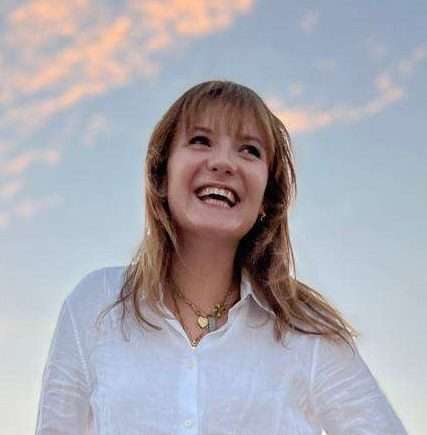Career, vision and passions of the manager who founded the Deloitte AI School programme
 by Robert Crowe
by Robert Crowe
She is not yet 30 years old and is grinding out successes one after the other, to the point of being recognised among the world’s 30 most important women in cybersecurity. Lucia Lucchini, born in 1994 and already listed by Forbes as one of Italy’s “cyberstar”, is now one of the two Italians (together with Elisa Romano) in the “Women in Cybersecurity” ranking of The Female Quotient, the prestigious US platform of Shelley Zalis that through initiatives such as the Equality Lounge at the world’s major conferences, including Davos, promotes gender equality in the global leadership community.
The digital revolution has radically changed our lives, changing the way we do business, entertain ourselves, take care of our health: every human activity is affected. Cybersecurity is therefore a strategic area, as it lies at the heart of organisations’ thinking and requires people to think differently. While women in cybersecurity today occupy only 25 per cent of jobs, it is important for FQ to identify the industry leaders working at the highest levels to innovate, safeguard and lead complex transformation programmes at some of the world’s largest companies.
 According to FQ, cybersecurity is a place for women, and the interviews with each of the 30 selected super managers bear witness to this. Lucia Lucchini works in Deloitte UK’s Cyber Risk practice, where she also founded the Deloitte AI School programme to empower young people in schools about the civil and social responsibilities of artificial intelligence. The author of numerous articles on the role of ethics in the digital world and the development of the regulatory landscape of new technologies, Lucia works as a consultant for various sectors internationally, particularly in the Middle East, where she began working in the field of privacy, data protection and research for the public sector, focusing on defence and strategic innovation.
According to FQ, cybersecurity is a place for women, and the interviews with each of the 30 selected super managers bear witness to this. Lucia Lucchini works in Deloitte UK’s Cyber Risk practice, where she also founded the Deloitte AI School programme to empower young people in schools about the civil and social responsibilities of artificial intelligence. The author of numerous articles on the role of ethics in the digital world and the development of the regulatory landscape of new technologies, Lucia works as a consultant for various sectors internationally, particularly in the Middle East, where she began working in the field of privacy, data protection and research for the public sector, focusing on defence and strategic innovation.
Given the underrepresentation of women in the industry and the great need for female role models such as Lucia who are beginning to establish themselves on the scene, it is perhaps no coincidence that her great talent does not have a background in cybersecurity. As she says: “I could never have imagined a career in cybersecurity if it wasn’t for an enlightening conversation I had during my master’s degree to discuss my thesis on hacktivism. A conversation about the cybersecurity threat landscape turned into the realisation that my passion for cybersecurity could become a real career”.
Among the professional projects closest to her heart is one in the Middle East, where she moved temporarily to work full-time on creating a cyberculture. “When I started working in this field, there was still a lot of confusion about what cybersecurity entailed. Now cybersecurity is a concern and a topic discussed through mainstream channels and at the dinner table. I believe that the increasing convergence of digital and organic – fuelled by cutting-edge technology, innovation and our current approach to these two areas – will bring discussions on security, privacy and ethics to the forefront of the debate and public literacy on the topic will require changes in three areas: media, education and regulation.”
 A career such as Lucia’s is based on a solid international education: after a Bachelor of Arts in Politics and International Studies at Warwick, she earned a Master’s degree in International Security Studies with a focus in militarisation and conflict strategies at the University of St. Andrews in Scotland. But also on the multidisciplinary experiences she has been able to put together from summer internships: ‘from the age of 17 (when she moved to the UK, ed.), I have had the pleasure of trying out different jobs, from the Louvre Museum to a consultancy firm, from market research for an advertising company to the press office of the Italian Embassy in London. (…) Everything I experienced and learned from, both positive and negative, was more than what I arrived with, so at the end of the day I am grateful for that.”
A career such as Lucia’s is based on a solid international education: after a Bachelor of Arts in Politics and International Studies at Warwick, she earned a Master’s degree in International Security Studies with a focus in militarisation and conflict strategies at the University of St. Andrews in Scotland. But also on the multidisciplinary experiences she has been able to put together from summer internships: ‘from the age of 17 (when she moved to the UK, ed.), I have had the pleasure of trying out different jobs, from the Louvre Museum to a consultancy firm, from market research for an advertising company to the press office of the Italian Embassy in London. (…) Everything I experienced and learned from, both positive and negative, was more than what I arrived with, so at the end of the day I am grateful for that.”
In her lovely interview for FQ, there is room to reminisce about her mentors, in her family and in her career, advice for young people who want to get involved in cybersecurity, how to “keep your feet on the ground” (as a true leader), and what she hopes to leave as her personal legacy: “Throughout my career, I have passionately fought against the concept of replaceability, which I know is present in people’s minds, from the lowest levels to senior management. I like to think I treat everyone the same way I expect to be treated. This, to me, means approaching everyone with full respect for their unique ability to contribute. It means being open and encouraging constructive discussions to cultivate ideas, receive and provide advice and endless opportunities for growth. Ultimately, I think it is the drive and motivation to make things happen in a responsible and ambitious way that I want people to remember me by.”
(Associated Medias) – Tutti i diritti sono riservati
